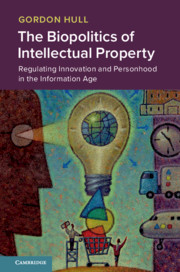 The Biopolitics of Intellectual Property
The Biopolitics of Intellectual Property Published online by Cambridge University Press: 01 November 2019
This chapter introduces and outlines the structure of the book and its argument.It begins with an extended look at litigation between two rival religious sects – the Worldwide Church of God and the splinter group Philadelphia Church of God – over access to doctrinal texts that the WGC owned the rights to, but that it had renounced.It thus provides a good example of how intellectual property can matter even in the most basic and intimate aspects of our lives.I then situate the book in the context of current literature on the expansion of intellectual property (IP) rights.Rather than note their expansion, I argue that the kind of power expressed in IP is subtly shifting.The chapter then offers a brief synopsis of the core Foucauldian theory behind the book – that power can operate according to different logics. It concludes with an outline of the remainder of the text.
To save this book to your Kindle, first ensure no-reply@cambridge.org is added to your Approved Personal Document E-mail List under your Personal Document Settings on the Manage Your Content and Devices page of your Amazon account. Then enter the ‘name’ part of your Kindle email address below. Find out more about saving to your Kindle.
Note you can select to save to either the @free.kindle.com or @kindle.com variations. ‘@free.kindle.com’ emails are free but can only be saved to your device when it is connected to wi-fi. ‘@kindle.com’ emails can be delivered even when you are not connected to wi-fi, but note that service fees apply.
Find out more about the Kindle Personal Document Service.
To save content items to your account, please confirm that you agree to abide by our usage policies. If this is the first time you use this feature, you will be asked to authorise Cambridge Core to connect with your account. Find out more about saving content to Dropbox.
To save content items to your account, please confirm that you agree to abide by our usage policies. If this is the first time you use this feature, you will be asked to authorise Cambridge Core to connect with your account. Find out more about saving content to Google Drive.